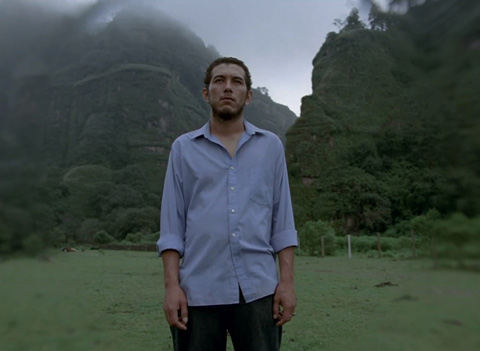
Post Tenebras Lux |
In an alphabetical list of 2013’s highlights, the credits roll:
The Act of Killing | directed by Joshua Oppenheimer | A bracing, unprecedented conceit — filmmaker offers genocidal Indonesian gangsters the opportunity to reenact their crimes in Hollywood style — yields devastating insight into how corruption enables both power and stupidity. This radically transparent documentary forces a mass murderer to realize what a wretch he is, and forces its audience to confront the slipperiness of truth and identification.
All is Lost | J.C. Chandor | As comfortable with awesome silence as it is with raging storms and the unknown motivations of its lead character — Robert Redford, as the impossibly iconic everyman we go to the movies for — Chandor’s second film exhibits as much confidence in its craft as it does in its audience, who spend as much time thinking with “Our Man” as they do about him.
Computer Chess | Andrew Bujalski | A devoutly analog film about early, very bulky digital technology, where a group of programming geeks gather in an attempt to create algorithms that are smarter than they are. The film’s gentle, absurd comedy — rendered with terrific period detail, and concerned with the limits of human feeling and intellect — packs a delicate yet cosmic wallop.
Drug War | Johnnie To | A crackerjack action film with the moody aura of early-’90s crime dramas, the prolific Japanese director moves to China to depict the tense battle of wits between a cop and a meth dealer looking to stay out of prison. Both men forsake the moral codes of their professions in To’s immaculately plotted film, whose breathless place somehow leaves space for a trenchant exploration of the consequences of globalization.
Frances Ha | Noah Baumbach | Baumbach revels in reminding us how incoherent and hypocritical we are, but he’s never done so with so much heart. Greta Gerwig’s Frances is a rare but common creation: she’s selfish but has little regard for herself, sexy but averse to romantic intimacy. The terrific cast surrounding Frances gives hipster pretension charm and soul, underlining the tension between who we are and who we think we are.
Let the Fire Burn/Leviathan | Jason Osder/Lucien Castaing-Taylor and Verena Paravel | Two uniquely immersive documentaries. The first inserts us in the mix of a fraught political firestorm, where the meaning of “the public interest” is impossible to determine. The other places us literally all over a Massachusetts fishing boat, nauseous, exhilarated, prey to both the elements and the violent mechanizations of commerce.
Like Someone in Love | Abbas Kiarostami | World cinema’s master of the intimate and technological problems of representation goes to Japan, where a beleaguered young woman is sent to a man who seems like her john but could be her grandfather. As always, the world outside the screen alters and intrudes upon our knowledge, here in staggering ways.
Post Tenebras Lux | Carlos Reygadas | A child in thrall to nature. An animated devil with a toolbox and unknowable intentions. A spa for philosophical sex tourists. A man who loses his head. A disconnected series of astonishing scenes that becomes an act of fractured, uncanny autobiography.
To the Wonder | Terrence Malick |The inevitable moment where Malick is accused of “self-parody” arrives at the moment where he most rigorously investigates his ongoing concerns: the importance and powerlessness of language; the parallels between the needs for romantic and religious faith; the ruination and reclamation of nature.
Upstream Color | Shane Carruth | Another love story about how romance can survive its mysterious and random origins and attain an enduring transcendence — this one wrapped up in a naturalist’s sci-fi plot — Carruth’s follow-up to Primer is a hyper-sensory technical marvel, structurally complex but emotionally precise.
Unseen OmissionsThe Wolf of Wall Street, Her, A Touch of Sin, At Berkeley
Honorable MentionsThe World’s End, These Birds Walk, No, Inside Llewyn Davis
Best Performance Oscar Isaac, Inside Llewyn Davis